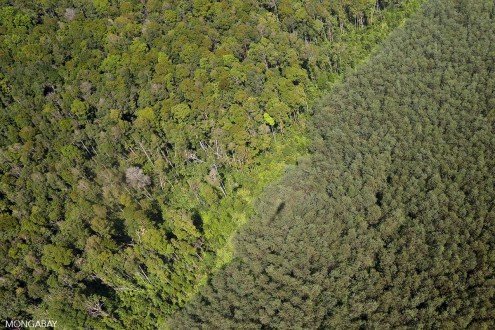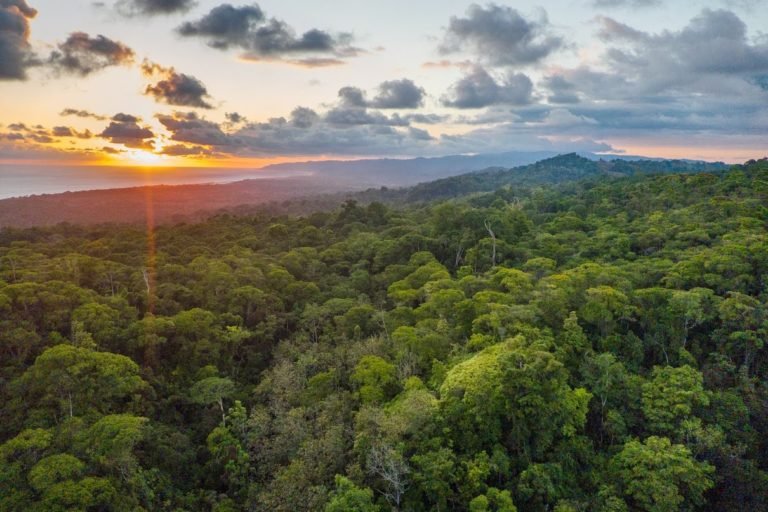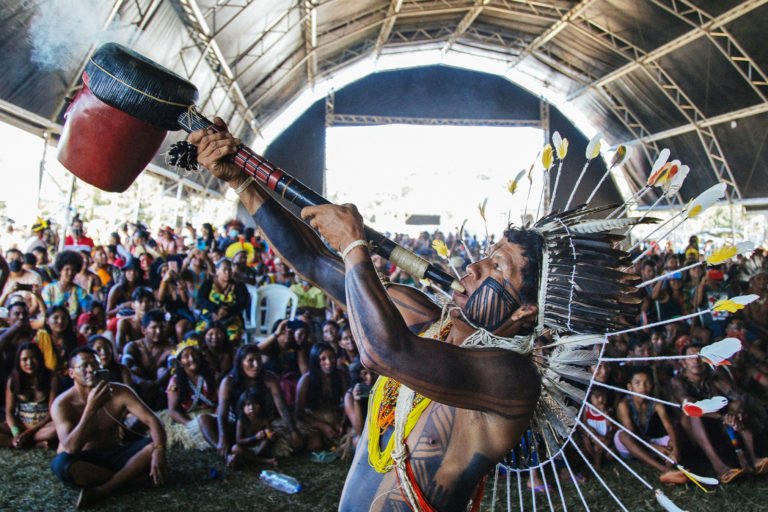- Decrees issued by the Brazilian government to protect Indigenous territories from outside threats have failed to deter illegal deforestation and may even be encouraging invaders who are betting on them not being renewed, critics say.
- In the first two months of this year, 116 hectares (287 acres) were deforested for cattle pasture and mining in Indigenous lands supposedly protected by these decrees, according to Instituto Socioambiental (ISA), a nonprofit that advocates for the rights of Indigenous and traditional peoples.
- Despite the figure representing an 83% reduction in deforestation from a year ago, Indigenous rights groups say deforestation continues to threaten isolated Indigenous peoples, especially in the absence of government action against the illegal occupation of their lands.
- Ancestral land rights are at the heart of protests currently underway in Brasília, where thousands of Indigenous people have converged for the country’s largest annual Indigenous demonstrations.
Legal restrictions meant to protect Brazil’s Indigenous territories from outside threats are failing to deter illegal deforestation and cattle ranching, fueling fears for the safety of uncontacted and isolated Indigenous peoples in these areas, a recent report warns.
Land-use restriction decrees are temporary legal orders issued by the federal government to protect non-demarcated Indigenous territories from any commercial activity and prohibit the entry of unauthorized people. However, in just the first two months of this year, 116 hectares (287 acres) were deforested for cattle pasture and mining in Indigenous lands ostensibly protected by these decrees, according to Instituto Socioambiental (ISA), a nonprofit that advocates for the rights of Indigenous and traditional peoples.
The figure represents an 83% reduction in deforestation from a year ago, which the ISA’s report attributes to police operations against severe deforestation within the Piripkura Indigenous Territory in Mato Grosso state, as well as unusually heavy rainfall that hampered illegal activities. However, the ISA reports that criminal invasions of these protected lands “continue at full speed, generating deforestation and putting the lives of Indigenous peoples who live in isolation at risk.”
This is a consequence of restriction decrees currently being renewed for just six months at a time, groups like the ISA argue, saying this is not enough time to effectively protect the areas and remove the loggers and ranchers illegally occupying the land. Previously, restriction decrees were usually renewed for up to three years at a time.
“Six months is a period that only benefits the illegal invaders,” Antonio Oviedo, coordinator of the ISA’s protected areas monitoring program, told Mongabay by phone. “It sends a message to invaders that the protected areas are abandoned.”
He added that the decrees’ short validity period encourages illegal occupation by loggers and ranchers hoping to secure land in case the decrees aren’t renewed later on. “When restriction decrees are nearing their expiry date, there’s an increase in invasions and deforestation,” Oviedo said.
This year, Funai, the federal agency for Indigenous affairs, renewed restriction decrees for three out of four Indigenous territories for a period of six months. All four territories are home to uncontacted and isolated Indigenous groups, including the Piripkura, one of the world’s most vulnerable uncontacted Indigenous peoples, whose restriction decree was renewed on April 4. Under the previous six-month period, from September 2021 to March 2022, during which the Piripkura territory was supposed to be protected by the decree, the ISA found 80 hectares (198 acres) of deforestation and evidence of cattle production inside the territory, according to Oviedo. Between August 2020 and July 2021, ISA detected 2,150 hectares (5,310 acres) of deforestation in the Piripkura territory, an almost hundredfold increase from the same period a year earlier.
“The illegal activity continued,” Oviedo said. “During these previous six months, nothing happened. Just the continuation of deforestation.”
In a news release, the ISA accused Funai of doing “nothing to protect these territories and the isolated Indigenous people who live in them,” adding that government inaction encourages invaders to illegally occupy territories and destroy them. Funai did not respond to Mongabay’s request for comment.
The ISA also reported that the Munduruku Indigenous Territory in Pará state has been heavily impacted by illegal mining, despite federal protection. In 2021, a total of 1,096 hectares (2,471 acres) were deforested in the Munduruku territory. In the first two months of this year, deforestation continued, with 71 hectares (175 acres) cleared within the region, according to the ISA. The territory made international news this year when pollution from illegal mining turned the normally crystal-clear waters of the Tapajós River a cloudy brown.
The Pirititi territory in Roraima state and the Ituna-Itatá in Pará state also had their restriction decrees renewed by six months recently; these are due to expire in June and August this year respectively. The decree for the Jacareúba/Katawixi territory, in Amazonas state, expired in December last year and still hasn’t been renewed, raising fears that recently identified isolated groups in the region are “under extreme risk.”
“They have no protection,” Oviedo said. “They are highly vulnerable to genocide and extermination. It’s a very serious situation.”
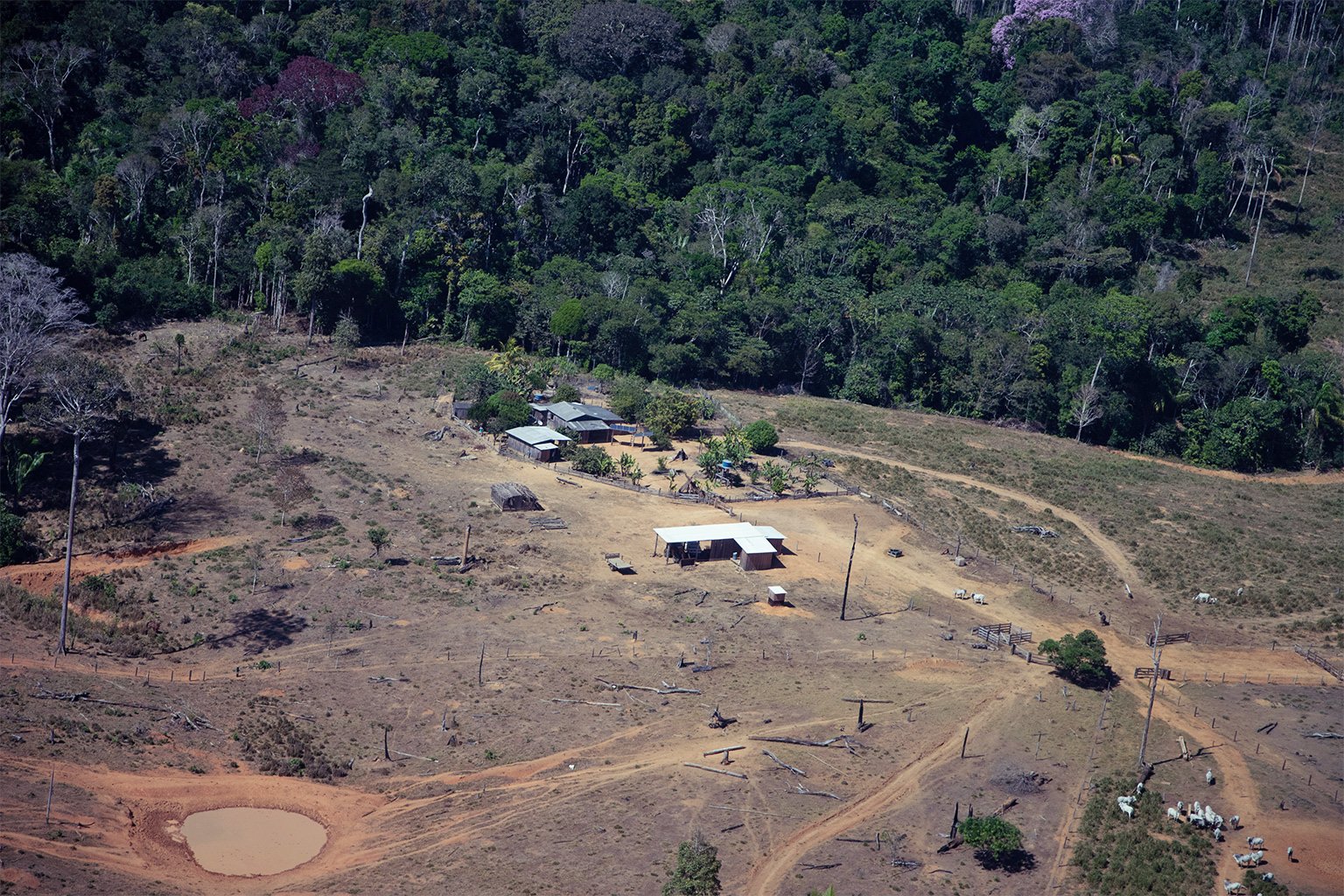
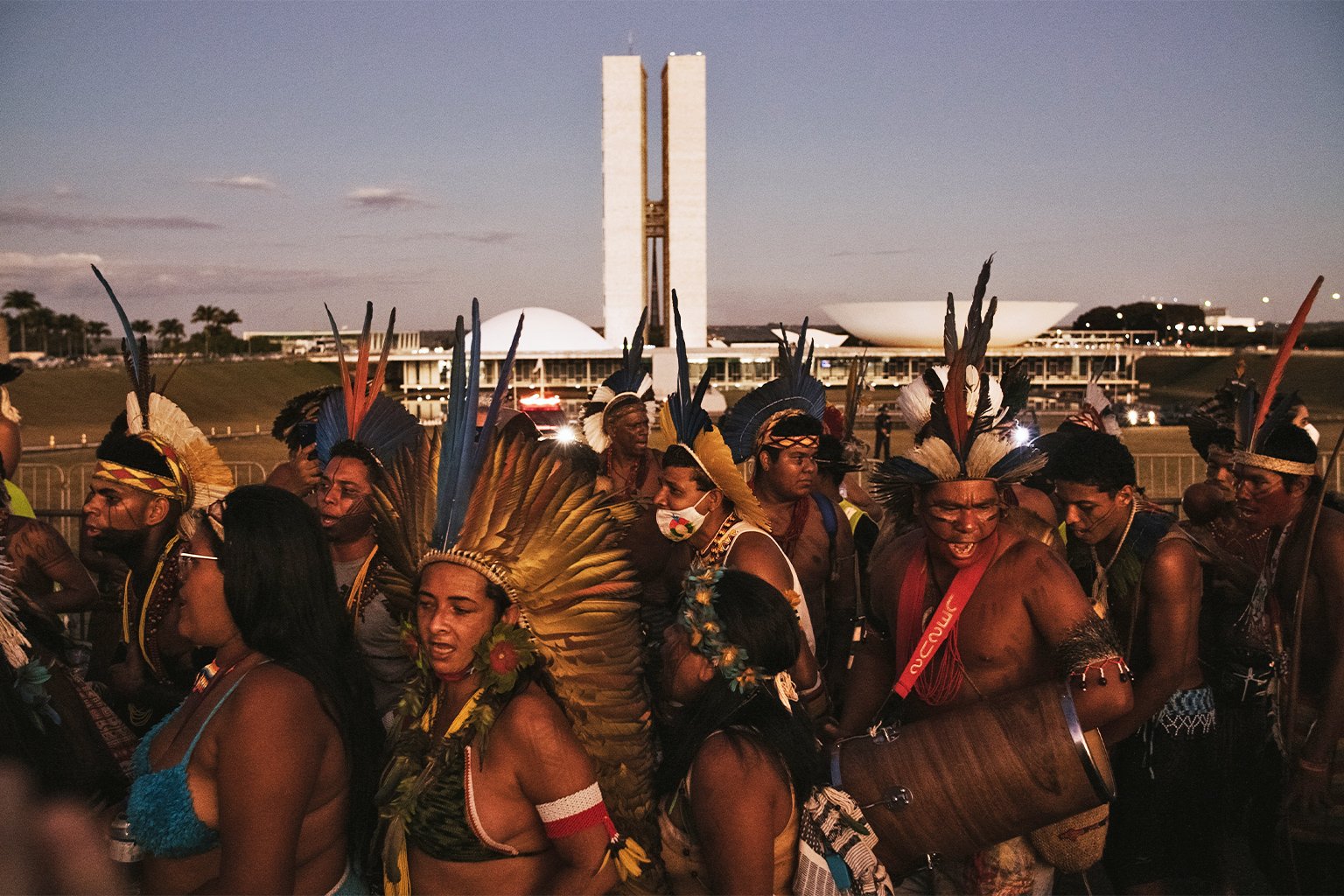
Protests urging land demarcation
Ancestral land rights are at the heart of protests being led by thousands of Indigenous people in Brasília, as restriction decrees fall short of guaranteeing Indigenous rights and proposed legislation threatens to outright violate their land rights.
As the country’s Congress prepares to vote this month on a bill that would open up Indigenous lands to mining and infrastructure, more than 6,000 Indigenous people from across the country have converged on the capital for a 10-day protest to raise awareness of their plight. The annual Free Land Camp 2022, the largest Indigenous demonstration in Brazil, aims to block these bills and campaign for Indigenous rights to land, education and health care. The ongoing protest is the first in-person Free Land Camp event since the COVID-19 pandemic broke out in 2020.
#Concentração para a Marcha #DemarcaçãoJá, durante o #Atl2022 que reúne mais de 6 mil indígenas, de 176 povos. No registro, indígenas Pataxó. Vídeo: Marina Oliveira/Cimi #DemarcaçãoJá #AldearPolítica #AbrilIndígena #MarcoTemporalNão #ATL18anos pic.twitter.com/zkntYpoZSZ
— Cimi (@ciminacional) April 6, 2022
Hundreds of indigenous people began gathering in the Brazilian capital for a 10-day protest camp to defend their land rights and oppose a government bill in Congress that would allow mining and oil exploration on their territories #AbrilIndígena #ATL2022 https://t.co/7YH4HaIySI pic.twitter.com/wPgK5H1fno
— Cristiane Fontes, Kriks 🌎 (@krikss) April 6, 2022
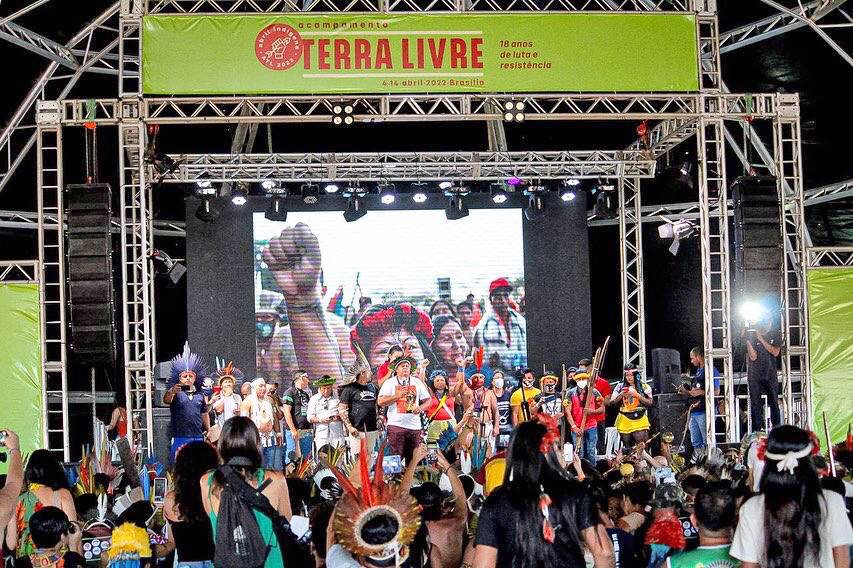
“It’s an important movement. It’s a space for a political debate and to raise these issues not just to politicians but to the general society and make them aware of what’s going on,” Gilberto Vieira, regional coordinator with the Indigenist Missionary Council (CIMI), an advocacy group affiliated with the Catholic Church, told Mongabay by phone. “They have the right to decide what they want for their lives.”
Even though the bill calling for mining on Indigenous territories has not yet been approved by Congress, the impacts of illegal mining are already being felt on the ground, according to the Articulation of Indigenous Peoples of Brazil (APIB), the organization behind the Free Land Camp event. “We have seen the contamination of our rivers and the devastation of our forests and entire communities,” it said in a statement sent to Mongabay.
“We organize and demonstrate because the most basic and fundamental right of the Indigenous peoples of Brazil has been violated in different ways for centuries: the right to life,” it added.
APIB also criticized the administration of President Jair Bolsonaro for giving the impression of trying to protect Indigenous rights, such as with restriction decrees, when its actual policies and bills suggest otherwise.
“We [Indigenous peoples] know that efforts are aimed at making it appear that [the government] meet our demands, that they respect and act for our rights, when in fact it’s the exact opposite,” the group said.
The Piripkura territory, for example, has been awaiting demarcation for almost 40 years. In 2019, Bolsonaro said that “as long as I am president, no Indigenous land will be demarcated” — a promise that has further hindered the protection of Indigenous land rights.
“There’s been a complete halt on demarcation due to the federal government,” Vieira said. “Not to demarcate any more Indigenous lands was, unfortunately, a promise the government kept.”
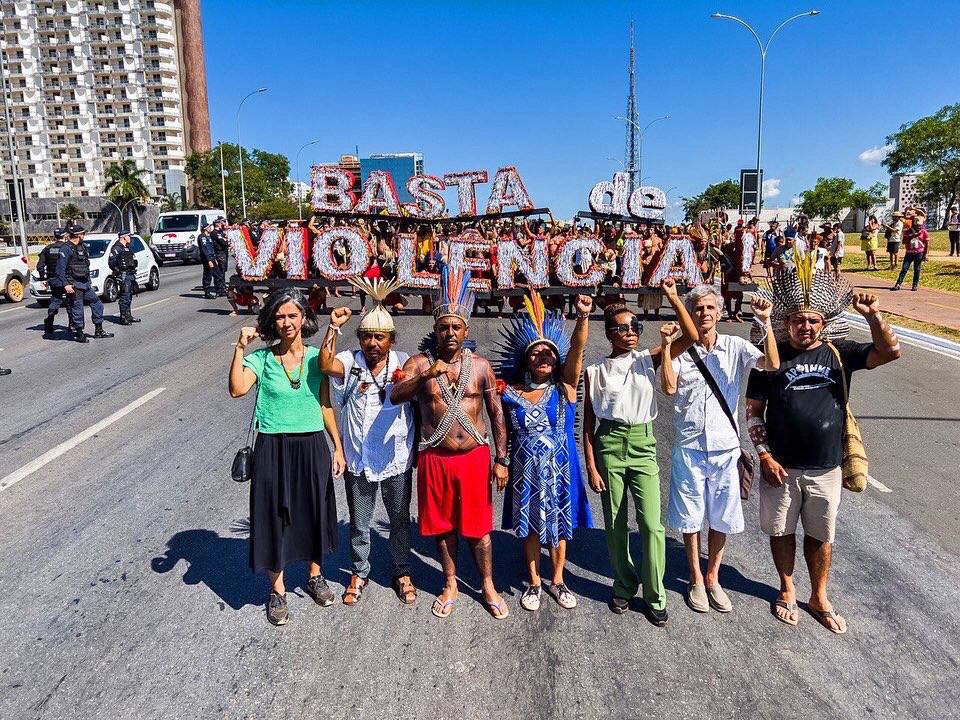
Banner image: An Indigenous man practices a ritual in front of a large crowd during the Free Land Camp 2022. Around 6,000 Indigenous people gathered in Brasília where they debated current issues that are affecting Indigenous and traditional peoples’ rights. Image © Tuane Fernandes/Greenpeace.
FEEDBACK: Use this form to send a message to the author of this post. If you want to post a public comment, you can do that at the bottom of the page.



